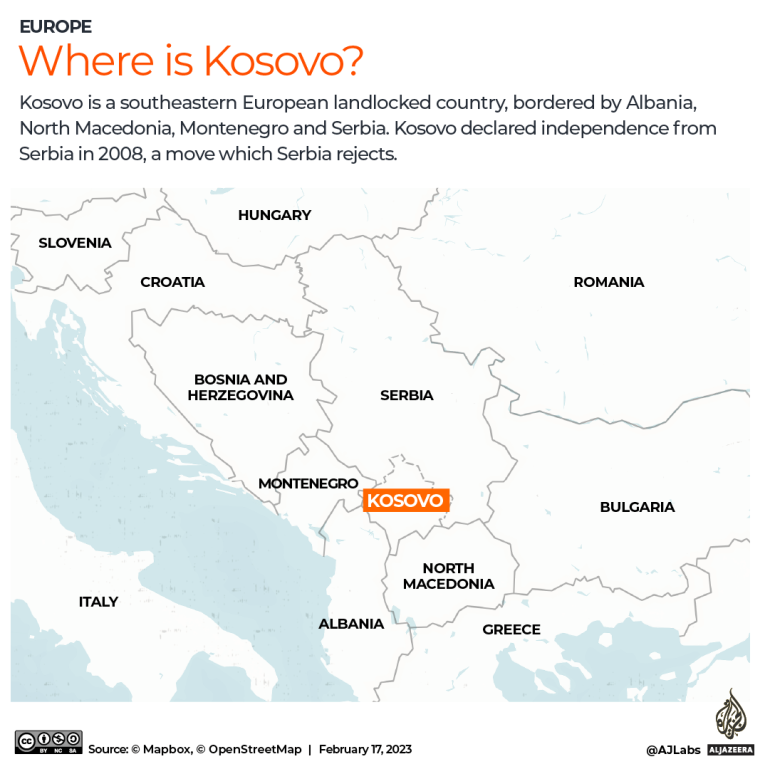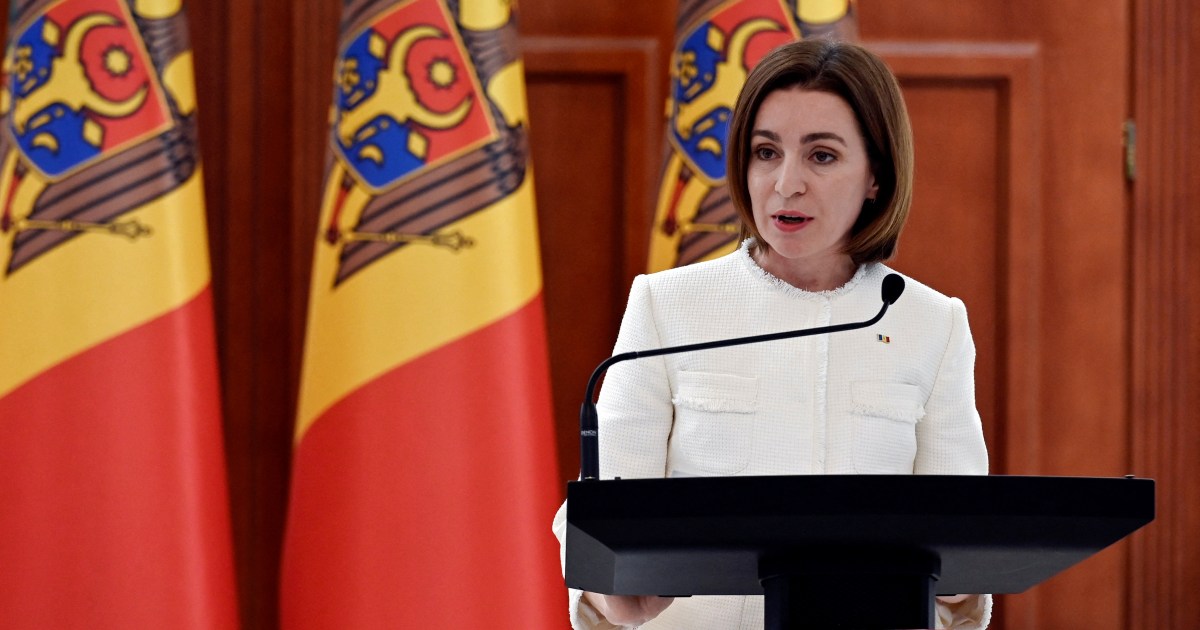Vucic ‘wants war’: Kosovo PM accuses Belgrade of inciting violence | Conflict News
Kosovo’s Prime Minister Albin Kurti says Serbian President Aleksandar Vucic planned and ordered an attack in northern Kosovo “to destabilise” the country with the goal of starting a war.
About 30 heavily armed Serbs stormed the village of Banjska last Sunday, fought Kosovo police in a gun battle, and barricaded themselves into a Serbian Orthodox monastery. A Kosovo policeman and three Serb attackers were killed.
Hours later, police retook the monastery where they found a large cache of weapons and ammunition. Six wounded members of the armed group were hospitalised in southern Serbia, according to Interior Minister Xhelal Svecla, while other attackers fled.
Kurti told Al Jazeera that Serb “paramilitary formations” in Banjska had equipment manufactured in Serbia that cannot be found on the open market.
While information is still being gathered by prosecutors and Kosovo police, “what we know is that we’ve confiscated five million euros [$5.3m] worth of ammunition and weapons and it was all manufactured in factories in Serbia,” Kurti alleged.
“Hand grenades, machine guns, everything that we confiscated was produced in Serbia and cannot be found on the market. It’s obvious the army of Serbia gave this to the paramilitary formations.”
Kurti said the ultimate goal of Sunday’s attack was for Serbia to stage a scenario and raise tensions.
“They wanted our police to enter the Banjska monastery so they could then share photos worldwide [showing] bullets on the monastery’s walls. That didn’t happen because our police are very strong and very professional and [the attackers] escaped.”
“They only wanted the start of a war to be on Sunday, September 24. [It’s well known] how the war started in Sarajevo. On March 1, 1992, during a wedding, an Orthodox Serb priest was injured. We were very careful that something similar doesn’t happen. But I think they wanted to repeat the scenarios from the beginning of the war [in former republics of Yugoslavia].”

Kurti said Milan Radoicic, a top Kosovo Serb politician who admitted on Friday that he planned the attack, “received logistical, military equipment and preparation from Belgrade, and also received political orders from President Vucic”, noting their close ties.
Radoicic – vice president of the “Serb List”, a Belgrade-supported Serb political party in Kosovo – resigned from his position on Friday and called the attack a “defence” operation against Kosovo authorities. But he has denied any involvement or support by the Serbian government.
‘Serbian security institutions’
Dan Ilazi, head of research at the Kosovar Centre for Security Studies, told Al Jazeera that German and US officials also acknowledged the equipment involved would be difficult to acquire without high-level connections.
“For instance, one of the grenade launchers they used can only be purchased by the permission of the government in Serbia. Plus, some of the individuals involved in this attack, according to Kosovo police, are part of the security establishment in Serbia,” Ilazi said, adding that Radoicic’s “connections to the Serbian government are very transparent”.
“The extent to which the Serbian president himself knew about this attack is debatable … The responsibility over this attack, the evidence presented so far, clearly seems to show participation of Serbian security institutions.
“My personal suspicion is that this perhaps is also instigated, or supported or encouraged by Russia, who maintains a strong presence in Serbian security institutions,” Ilazi said.
Vucic and his office did not respond to Al Jazeera about the allegations, but he has denied any government involvement in Sunday’s attack.
On Thursday, he told the Reuters news agency that Serbia will investigate the origin of the seized weapons including a cache of assault rifles, anti-tank rocket launchers, hand grenades, land mines and drones.
“Why this would be beneficial for Belgrade? What would be the idea? To destroy our position we have been building for a year? To destroy this in a day? … Serbia does not want war,” Vucic said.
He said suspects will be investigated and Radoicic would be “summoned by the prosecutor”.
In turn, Vucic accused Kurti of wanting to expel Serbs from Kosovo.
Kurti’s refusal to form an Association of Serb Municipalities, as part of the 2013 agreement between Belgrade and Pristina that would allocate Kosovo Serbs more autonomy, is what fueled tensions leading to violence in Banjska, he said.
Vucic told Serbian TV he has year-old information that Serbs in Kosovo have been preparing for resistance, noting the barricades Serb residents set up more than a year ago.
“The situation is boiling … Kurti did this, he united Serbs,” said Vucic.
Some 50,000 Serbs who live in north Kosovo do not recognise Pristina institutions and view Belgrade as their capital. Clashes have repeatedly occurred with Kosovo police and NATO-led peacekeepers known as KFOR. But Sunday’s violence was the worst in years.
‘They came to attack’
Kurti questioned what a heavily armed Serb paramilitary group was doing in a 14th-century monastery in Banjska.
“Who are they defending there? They came to attack… [Vucic] loves war, he wishes for war and he wants war because he wants a Republika Srpska in Kosovo,” Kurti told Al Jazeera, referring to the Serb-led entity in Bosnia and Herzegovina, formed during the Dayton peace agreement in 1995, which formally ended the war but is the source of much turmoil today.
“[Republika Srpska was formed] because there was a war and a genocide in Bosnia. And now he wants a war and one more genocide in Kosovo so he can get a Republika Srpska [in Kosovo], but he won’t,” Kurti added.
Meanwhile on Friday, White House National Security Council spokesman John Kirby told reporters the United States is calling on Serbia to withdraw its forces from the border, after it detected an “unprecedented” Serbian military build-up – “a very destabilising development”.
In a statement on Friday, Secretary of State Antony Blinken said he spoke with Vucic to de-escalate tensions. He “welcomed KFOR’s increased presence and the North Atlantic Council’s decision to authorise additional forces”.
To avoid such attacks from happening again, Kurti told Al Jazeera two things are urgently needed – security for Kosovo and sanctions for Serbia.
“All the time they are running some military drills by our border … I think this is very dangerous. They will think you are either afraid or weak. That’s why the international community – the European community, NATO, the US and the UK – must show and prove to Belgrade that a return to the 1990s will not be allowed.”




